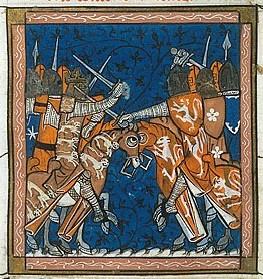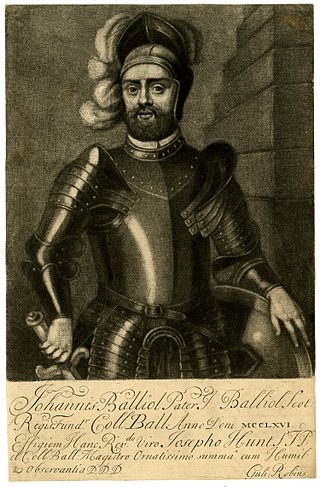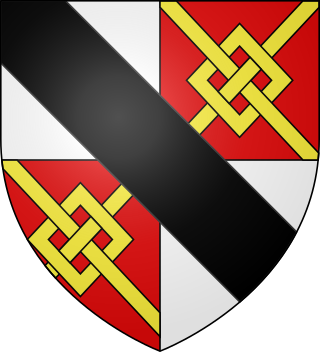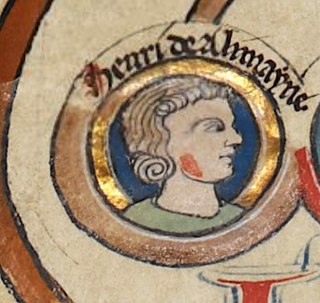Related Research Articles

Roger Mortimer, 1st Baron Mortimer of Wigmore, of Wigmore Castle in Herefordshire, was a marcher lord who was a loyal ally of King Henry III of England and at times an enemy, at times an ally, of Llywelyn ap Gruffudd, Prince of Wales.

Roger de Quincy, 2nd Earl of Winchester, hereditary Constable of Scotland, was a nobleman of Anglo-Norman and Scottish descent who was prominent in both England and Scotland, at his death having one of the largest baronial landholdings in the two kingdoms.

The Lord Warden of the Cinque Ports is a ceremonial official in the United Kingdom. The post dates from at least the 12th century, when the title was Keeper of the Coast, but may be older. The Lord Warden was originally in charge of the Cinque Ports, a group of five port towns on the southeast coast of England that was formed to collectively supply ships for The Crown in the absence at the time of a formal navy. Today the role is a sinecure and an honorary title, and fourteen towns belong to the Cinque Ports confederation. The title is one of the higher honours bestowed by the Sovereign; it has often been held by members of the Royal Family or prime ministers, especially those who have been influential in defending Britain at times of war.

The Second Barons' War (1264–1267) was a civil war in England between the forces of a number of barons led by Simon de Montfort against the royalist forces of King Henry III, led initially by the king himself and later by his son, the future King Edward I. The barons sought to force the king to rule with a council of barons, rather than through his favourites. The war also involved a series of massacres of Jews by de Montfort's supporters, including his sons Henry and Simon, in attacks aimed at seizing and destroying evidence of baronial debts. To bolster the initial success of his baronial regime, de Montfort sought to broaden the social foundations of parliament by extending the franchise to the commons for the first time. However, after a rule of just over a year, de Montfort was killed by forces loyal to the king at the Battle of Evesham.

John de Balliol was an English nobleman, belonging to the House of Balliol. Balliol College, in Oxford, is named after him.

Hugh le Despenser, 1st Baron le Despenser was an important ally of Simon de Montfort during the reign of Henry III. He served briefly as Justiciar of England in 1260 and as Constable of the Tower of London.

Hugh le Despenser, sometimes referred to as "the Elder Despenser", was for a time the chief adviser to King Edward II of England. He was created a baron in 1295 and Earl of Winchester in 1322. One day after being captured by forces loyal to Sir Roger Mortimer and Edward's wife, Queen Isabella, who were leading a rebellion against Edward, he was hanged and then beheaded.

Henry of Almain, also called Henry of Cornwall, was the eldest son of Richard, Earl of Cornwall, afterwards King of the Romans, by his first wife Isabel Marshal. His surname is derived from a vowel shift in pronunciation of d'Allemagne ; he was so called by the elites of England because of his father's status as the elected German King of Almayne.
Peter de Montfort of Beaudesert Castle was an English magnate, soldier and diplomat. He is the first person recorded as having presided over Parliament as a parlour or prolocutor, an office now known as Speaker of the House of Commons. He was one of those elected by the barons to represent them during the constitutional crisis with Henry III in 1258. He was later a leading supporter of Simon de Montfort, 6th Earl of Leicester against the King. Both he and Simon de Montfort were slain at the Battle of Evesham on 4 August 1265.

Henry de Hastings of Ashill, Norfolk, was a supporter of Simon de Montfort in his rebellion against King Henry III. He led the Londoners at the Battle of Lewes in 1264, where he was taken prisoner, and fought at the Battle of Evesham in 1265, where de Montfort was killed. He resisted King Henry III's extensive siege of Kenilworth and after the Dictum of Kenilworth he commanded the last remnants of the baronial party when they made their last stand in the Isle of Ely, but submitted to the king in July 1267. In 1264 he was created a supposed baron by de Montfort, which title had no legal validity following the suppression of the revolt.

Simon VI de Montfort, known as Simon de Montfort the Younger, was the second son of Simon de Montfort, 6th Earl of Leicester and Eleanor of England.
Giles de Argentine was a baronial leader in England. He was the son of Richard de Argentine, a justiciar in Normandy, whom he succeeded in 1247.
Ralph Basset, was an English baronial leader.
The Lieutenant of the Duchy of Aquitaine was an officer charged with governing the Duchy of Aquitaine on behalf of the King of England. Unlike the seneschalcy of Gascony, the lieutenancy was not a permanent office. Lieutenants were appointed in times of emergency, due either to an external threat or internal unrest. The lieutenant had quasi-viceregal authority and so was usually a man of high rank, usually English and often of the royal family.
Ralph Basset, 1st Baron Basset of Drayton Bassett in Staffordshire, was an English nobleman who fought in both the Anglo-French War and in the First War of Scottish Independence. He was the son of one of Simon de Montfort's barons, Ralph Basset (d.1265), and Margaret de Somery. In 1291, he was made Governor of Edinburgh Castle. He was created 1st Baron Basset of Drayton in 1295.
Henry Audley was an English baron.
Sir James de Audley [Knight], Justiciar of Ireland, was an English baron and magnate.
Baron Basset of Drayton of Drayton in the county of Stafford was a title in the Peerage of England.

Richard Stafford, 1st Baron Stafford of Clifton, Lord of Clifton, was an English soldier and diplomat during the Hundred Years' War. He was the second son of Edmund Stafford, 1st Baron Stafford and Margaret Basset, and the younger brother of Ralph Stafford, 1st Earl of Stafford.
Robert de Vieuxpont, Lord of Appleby, was an English noble. He fought on the side of Simon de Montfort, 6th Earl of Leicester during the Second Barons' War. He was injured and later died from his wounds received at the Battle of Lewes in 1264.
References
- 1 2 3 Stephen, Leslie, ed. (1885). . Dictionary of National Biography . Vol. 3. London: Smith, Elder & Co.
- Attribution
![]() This article incorporates text from a publication now in the public domain : Stephen, Leslie, ed. (1885). "Basset, Ralph (d.1265)". Dictionary of National Biography . Vol. 3. London: Smith, Elder & Co.
This article incorporates text from a publication now in the public domain : Stephen, Leslie, ed. (1885). "Basset, Ralph (d.1265)". Dictionary of National Biography . Vol. 3. London: Smith, Elder & Co.